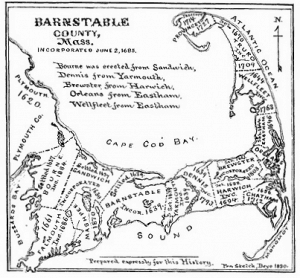How Critical Race Theory Wrongly Interprets God’s Blessings as Something of Which Believers—Especially White Believers—Ought to Be Ashamed

Once you buy the argument that some segment of the citizenry should lose their rights, just because they are envied or resented, you are putting your own rights in jeopardy — quite aside from undermining any moral basis for respecting anybody’s rights. You are opening the floodgates to arbitrary power. And once you open the floodgates, you can’t tell the water where to go.
—Social researcher and economist Thomas Sowell—
Key point: When believers, who are commanded by God to be thankful for His blessings, are made to feel guilty for those blessings, they have been manipulated by an unbiblical ideology.
A printable PDF file of this article is available here.

Last time William Bradford, Governor of the Plymouth Settlement, told us about the Pilgrims’ two-year experiment with an economic system that denied individual property rights and that stipulated the community would hold all things produced and consumed in common. The economic model they tried later would become known as socialism—and it failed completely.
Knowing they’d all die if they continued operating under this model, the Pilgrims ditched it and replaced it with a free-market-economy model. And none too soon, either. The change saved the colony and quite probably extended the lives of every Pilgrim involved.
Socialism didn’t work because it doesn’t work. As David Horowitz notes, socialism cannot work “because it is based on false premises about human psychology and society, and gross ignorance of human economy.”
Socialism cannot work because “because it is based on false premises about human psychology and society, and gross ignorance of human economy.”
—David Horowitz—
Critical Race Theory: An Unbiblical Ideology
Even though the experience of Bradford and his fellow Pilgrims sounds forth an all-important warning to avoid the Marxist “ideal” of socialism, many other lessons abound as well. In this post and the next I want to zero in on something the Pilgrims’ experience teaches us about gratitude, as well as the warning it issues about another Marxist ideology—Critical Race Theory, or CRT.
CRT is all the rage right now, even among evangelicals. We have warned about it in previous posts, but the Pilgrims’ example of gratitude—even before the Thanksgiving celebration of 1623, and even before what many consider the first Thanksgiving celebration of 1621—give us a golden opportunity to sound the warning anew.

What is critical race theory? Basically, it is an ideology that sees society in terms of just two groups—oppressors and victims. Whites are the oppressors, even if they don’t realize it, and blacks and other minorities are victims. This is true, says CRT, because whites have benefitted, and blacks have been held back, due to racist policies and practices that have been embedded in American culture.
Critical race theory basically sees society in terms of just two groups—oppressors and victims. Whites are the oppressors, even if they don’t realize it, and blacks and other minorities are victims. This is true, says CRT, because whites have benefitted, and blacks have been held back, due to racist policies and practices that have been imbedded in American culture.
Whites need to repent of their “whiteness” and reject their status of “privilege.” In turn, blacks and other minorities need to be given privileges they’ve previously been denied—to compensate for the supposed oppression they’ve endured. Never mind that slavery was abolished long ago, that lynchings no longer are practiced, and that Jim Crow laws have been overturned. Never mind that, generally speaking, 21st-century Americans are not racists. Despite all these things, CRT declares whites guilty for sins of the distant past and contends blacks are victims deserving of compensation for oppression they did not directly experience. A very short presentation titled “Some Things You Need to Know About Critical Race Theory” provides some additional helpful information.
Of course, none of this is to say that racism never occurs in modern American life; nor is it to say that it shouldn’t be condemned whenever and wherever it appears. We must condemn it! That said, we also should add that as a matter of authentic justice, no person or group ever should be held responsible for wrongs they did not commit, nor should any person or group be made to feel like victims when they haven’t truly been oppressed.
Systemic? Not so fast!
But, say social justice crusaders, the racism we’re talking about is systemic, sometimes hidden but solidly embedded in the culture. This is their assumption, but where is the evidence? While we cannot dive deeply into this aspect of the matter in our discussion here, we can make a couple of brief but important points.
Racism exists, but as this Capstone Report article points out, it is a sin that is condemned by both Christians and by the secular culture. A great many actions the Bible calls sins not only are deemed acceptable, but are celebrated in American society today. You would think that if racism were systemic, it would not be universally condemned.
Is the fact that many congregations are segregated, or nearly segregated, evidence of racism among Christians? Not necessarily! Hear former Vanderbilt University Professor Carol Swain addresses this issue in the following video.
Gratitude to God Is Incompatible with CRT
In previous posts, we have contended that one of the reasons the social justice movement (of which CRT is a core component) is unbiblical is because of these facts.
Here we will focus on another biblical reason the social justice movement and CRT are incompatible with the Christian faith and sound theology.
CRT eliminates gratitude and insists on false guilt.
It was a Babylon Bee article that provided insight for me on this. The Babylon Bee is a satirical online publication, yet through satire, its creative team presents the truth in very pointed and effective ways. The article declares, “Adapting to modern times, Thanksgiving Day has been eliminated. Instead, it’s being replaced by a new holiday called ‘Check Your Privilege Day.'” Social justice crusaders won’t be that honest, but this is their perspective anyway!
How might God respond to a point of view that seeks to turn His blessings into sins for which whites should feel guilty? We need to understand that such a posture is an affront to a gracious and benevolent God, the One “from whom all blessings flow.” Furthermore, this perspective is an affront to a God who is holy and righteous, the Supreme Being to whom all of us are accountable. Turning gratitude into guilt is, I believe, effectively spitting in His face!
Some of Our Responsibilities Before God
Consider these Bible passages, which carry the themes of wealth, discipline, hard work, stewardship, God’s favor, and gratitude. You can read all of them at biblegateway.com here, or on a Word Foundations page here.
Deuteronomy 8:11-19; Psalm 100; Psalm 103:1-5; Psalm 112; Proverbs 13:4; Proverbs 13:11; Proverbs 13:22; Proverbs 13:25; Proverbs 28:19; Ecclesiastes 3:12-13; Ecclesiastes 5:18-20; Matthew 25:14-30; Luke 12:13-21; Luke 12:42-48; Ephesians 4:28; 1 Timothy 6:17-19; James 1:16-17
I challenge my readers to find any indication—any—in these passages that people whom God blesses should feel guilty for being blessed. Social justice crusaders (or social justice warriors, SJWs), will push the idea of guilt over gratitude, so they won’t use the term “blessings.” Instead, they will use the terms privilege and white privilege to disparage God’s blessings. Then they will engage in all out assaults on whites for being recipients of His gracious provision. They’ll condemn them for benefitting from a system that intentionally and viciously holds blacks down. Yet, as we already have started to see, evidence for ongoing systemic oppression against blacks is lacking. Moreover, evidence of God’s goodness in America is not found only among whites.
Take a look at these Scripture passages once again. While none of the passages indicates having wealth is sinful, these passages, in fact, do condemn
-
-
- ingratitude,
- laziness,
- a failure to recognize God as the source of one’s blessings,
- trusting in one’s riches for ultimate security,
- greed,
- coveting,
- insensitivity to the poor and others in need (something very different from merely having wealth and material goods),
- mismanagement of resources,
- dishonesty,
- stealing,
- a lack of moral character, and
- pride.
-
The one event in Scripture to which people might point to show that having wealth is sinful in and of itself can be found in Luke 18:18-23, with parallel passages in Matthew 19:16-22 and Mark 10:17-22. Here Jesus tells the rich young ruler who had asked Him how he could have eternal life, “You still lack one thing. Sell all that you have and distribute to the poor, and you will have treasure in heaven; and come, follow Me.”

Yet, the problem here wasn’t the young man’s having wealth, it was his loving wealth to a point of ignoring what, and who, were supremely important (read again 1 Tim. 6:17-19). In other words, it was how this man saw and responded to his wealth that was the issue. Bible scholar William Hendriksen emphasizes that in saying to the man “follow Me,” Jesus not only was saying, “trust in Me,” but also “trust completely in Me.”1
Anyone who still contends that merely having wealth is sinful should read carefully the verses following Matthew’s, Mark’s, and Luke’s accounts of Jesus’ conversation with the rich young ruler. In light of what they’d heard, Jesus’ disciples asked if a rich man could make it into the kingdom of heaven. Jesus indicated that while it would be difficult for a wealthy individual to surrender completely to Him and thereby enter heaven, He also affirmed that “[t]he things which are impossible with men are possible with God.”
Learning from History—and from the Pilgrims’ Own Example
Although not perfect, the Pilgrims got the two major elements related to this particular issue right. Of course, critical race theory had not yet been devised—but these Christians who had made their way to the New World still could have been way off base with regard to
-
-
- gratitude toward God, and
- their attitude toward the native Americans they encountered.
-
Significantly, as we have said, they got both of these right—and next time we will provide historical evidence to prove it.
Stay tuned!
You can access additional articles in this series from this page.
Copyright © 2019 by B. Nathaniel Sullivan. All rights reserved.
Unless otherwise indicated, Scripture has been taken from the New King James Version®. Copyright © 1982 by Thomas Nelson, Inc. Used by permission. All rights reserved.
top image credit: Lightstock
Note:
1William Hendriksen, The Gospel of Luke, (Grand Rapids: Baker Book House, 1978), 834.


Be First to Comment